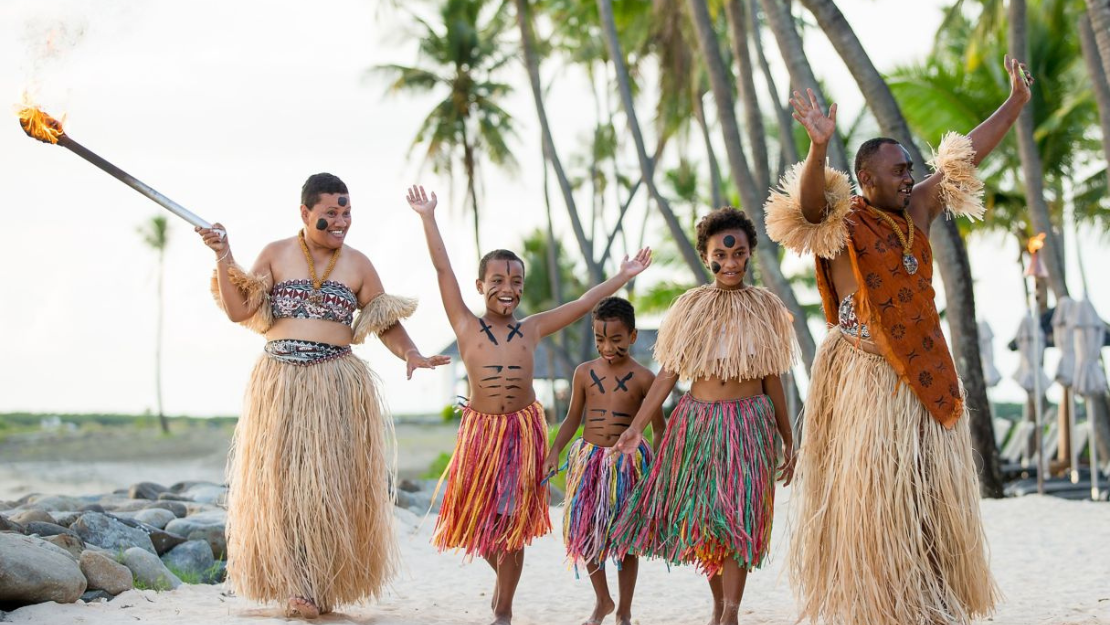



















Your Guide to the Fijian Language and Basic Phrases
If you’re planning a trip to Fiji, you may be wondering whether you need to learn another language! Worry not, English is commonly spoken across Fiji, especially in the main tourist areas. However, it doesn’t hurt to learn a few basic Fijian phrases, to better help you connect with the locals
What language is spoken in Fiji?
There are three official languages in Fiji: English, Fijian and Hindi (although a dialect much different from what is spoken in India). Native Fijians speak Fijian as their first language, Indo-Fijians speak Hindi as their first language, and both groups speak English as a second language.
While many other languages in the Pacific, such as Hawaiian and Māori, are struggling for survival, the Fijian language has never been in serious danger of extinction, despite being ignored for a long time in schools. The vast majority of Fijians have always spoken it as their everyday language, and most Indo-Fijians understand at least some phrases. In rural communities, like Levuka, Taveuni and Savusavu, almost all Indo-Fijians can speak Fijian fluently.
Fijian Bau
The traditional Fijian language has several different dialects, spoken throughout the various islands. However, the ‘official’ Fijian language is based on Bau Fijian. It is estimated that 54% of the population is fluent in Fijian, whether as a first or second language. An Austronesian language, Fijian is spoken by the indigenous inhabitants of Fiji, who first arrived approximately 3,500 years ago from Vanuatu and the Solomon Islands.
English
English is the primary language in Fiji, being the main language of business, government and education, as well as in daily conversation. Fiji was declared a British colony in 1874 and, despite gaining independence in 1970, the impact of this British influence has remained. Fijians embrace English and the positive impact the language has on tourism. Just as the common language helps visitors communicate their questions and concerns, English allows Fijian locals to ask questions and converse with visitors.
Fijian Hindi
During British rule in Fiji, thousands of workers from India were imported to develop a plantation economy. Eventually, these labourers settled down in Fiji, and the Hindi language eventually evolved into what is today known as Fijian Hindustani, or Fijian Baat. Roughly 37% of people living in Fiji speak Hindi. However, some words and phrases from both Fijian and English have become part of the Fijian Hindi dialect, creating a variant of the traditional Hindi you would hear in India itself.
Other common language spoken in Fiji
While the above are the three official languages of Fiji, there are various other languages spoken by minorities throughout the country. Some of these include:
Rotuman – spoken by the people living on the remote island of Rotuma. This is not a dialect of Fijian, but its own separate language.
Gujarati and Punjabi – both spoken by Indian immigrants living on the islands.
Cantonese and Mandarin – both spoken by Chinese immigrants living on the islands.
Tongan – spoken by both Tongan immigrants and local Fijians of Tongan descent.
Fijian Language Pronunciation
If you are going to learn a few Fijian phrases before you visit, it’s important to note that the Fijian language uses different vowel sounds than English. Additionally, many letters are pronounced differently in Fijian. For example:
- The letter ‘D’ has an unwritten ‘N’ in front of it. For example, the city of Nadi is pronounced ‘Nandi’ and the popular seafood dish, kokoda, is pronounced ‘kokonda’.
- The letter ‘G’ also has an unwritten ‘N’ in front of it. For example, the town of Sigatoka is pronounced ‘Singatoka’.
- The letter ‘C’ is pronounced ‘th’. For example, the Mamanuca Islands are pronounced ‘Mamanuthas’.
- The letter ‘B’ has an unwritten ‘M’ in front of it. For example, the island of Toberua is pronounced ‘Tomberua’.
Basic Phrases in Fijian
Here are some of the best phrases to learn before you visit Fiji:
Hello – bula
Yes – io
No – sega
Please – yalo vinaka, mada
Thank you – vinaka
Thank you very much – vinaka vakalevu
Good morning – (ni sa) yadra
Excuse me – tulou
I’m sorry – lomana
Goodbye (ni sa) moce
Toilet – vale lailai
Ready to explore beautiful Fiji? To learn more about our unbeatable holiday packages, contact our Fiji Holiday Experts or start browsing our range of Fiji hot deals.
